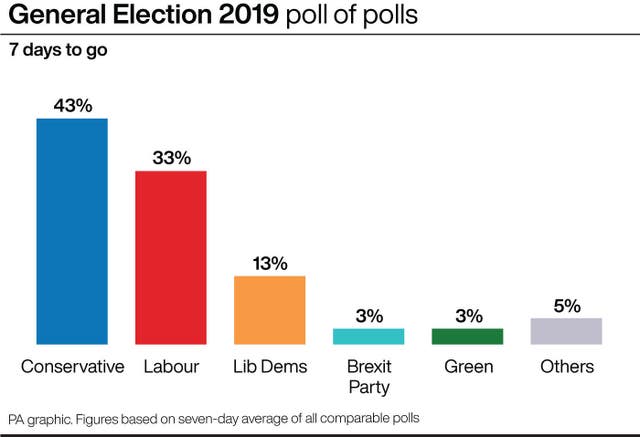Farage accuses MEPs who quit Brexit Party of personal links with Tories
Annunziata Rees-Mogg, Lance Forman and Lucy Harris dramatically announced on Thursday they were leaving the party.

Nigel Farage has accused three MEPs who quit his Brexit Party and urged people to vote Conservative of having personal links with the Tories.
He insisted that Boris Johnson’s EU withdrawal deal remained “unacceptable” despite the trio resigning the whip to back the Prime Minister’s push to “get Brexit done”.
Annunziata Rees-Mogg – sister of Commons Leader Jacob Rees-Mogg – Lance Forman and Lucy Harris dramatically announced they would leave the Brexit Party on Thursday morning.
It follows the decision earlier this week to sack John Longworth, the former director general of the British Chambers of Commerce, for “repeatedly undermining” Mr Farage’s election strategy.
Mr Farage told the BBC’s Andrew Neil: “One of them is a sister of a Cabinet minister, another one has a boyfriend working for that Cabinet minister, fact, and another one is a personal friend of Boris Johnson’s.”
He added: “They joined the coalition that I put together. Now they clearly were disaffected with Mrs May as leader and were not a Conservative Party.
“And I’ll tell you something, Boris Johnson’s deal unamended is unacceptable and I certainly stand by that.”

The Brexit Party leader earlier said he was “disappointed” by the decision of the three MEPs, which will come as a blow to the party just a week before polling day.
Ms Rees-Mogg earlier denied that her brother or anyone in the Conservative Party played a role in her decision to quit the Brexit Party.
“I have had no approaches from the Conservative Party in any description and I am frankly finding it really quite disturbingly old-fashioned that people are suggesting that my brother gets to tell me what to do with my political views – he doesn’t,” she said.
Elsewhere on the campaign trail, Mr Johnson backed his chances of securing a trade deal with the EU by the end of the transition period next year.
“We already have a deal,” he told media and staff at a mill shop near Matlock in Derbyshire.
“And we can come out on January 31 in a state of perfect equilibrium and grace with the rest of the EU because we have a zero-tariff, zero-quota position now, and I’ve absolutely no doubt at all that we’ll be able to make sure that the EU protects its own interests and has a deal with us that ensures that continues for the future …
“If you say ‘can I absolutely guarantee that we’ll get a deal’, I think I can and I’ll tell you why – look at what we achieved … in three months with the new deal that I did …
“We did it and it’s a great deal and it will take this country forward and I’m very proud of it.”
Asked if it was a “cast-iron guarantee”, the Prime Minister said: “The possibility you allude to simply will not happen.”
Mr Johnson’s campaign bus was met by protesters shouting “hey, hey, ho, ho, Boris Johnson’s got to go” as it arrived in Derbyshire for an election visit on Thursday afternoon.
Labour activists were among those outside the venue, along with a group holding signs about the “climate emergency”.
Labour, meanwhile, has faced further criticism over its handling of anti-Semitism within party ranks.
Lawyers for the Jewish Labour Movement (JLM) said 70 Labour staffers past and present had given sworn testimony into an official inquiry by the Equalities and Human Rights Commission (EHRC) into anti-Semitism in the party.
According to a leaked copy of its submission to the inquiry, the JLM said Labour was “no longer a safe space” for Jewish people or those who stood up against anti-Semitism.
Jeremy Corbyn rejected claims he had made Labour a “refuge” for anti-Semites, telling reporters on Thursday: “I completely reject that.”
He said: “When I became leader of the party, there were no processes in place to deal with anti-Semitism.
“We introduced an appeals procedure to deal with it and we introduced an education process, so that party members understood the hurt that can be caused by anti-Semitic remarks or anti-Semitic behaviour.
“I think we’ve got processes in place that have improved it a great deal.”





